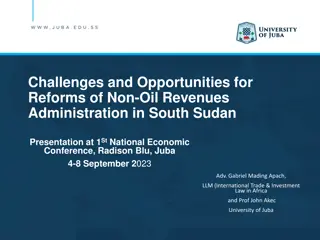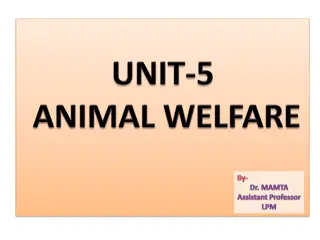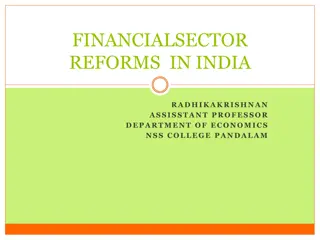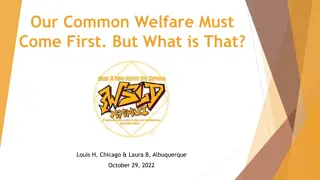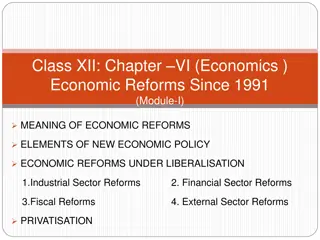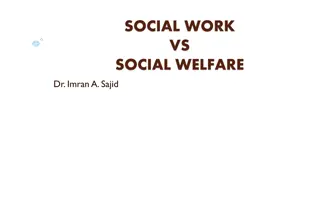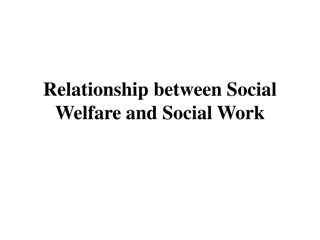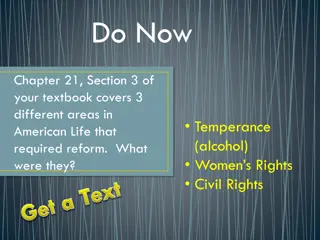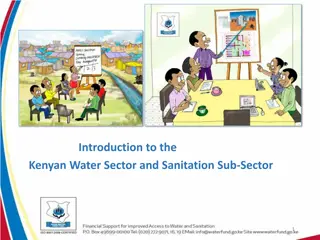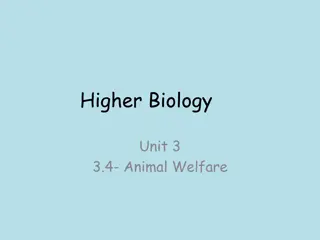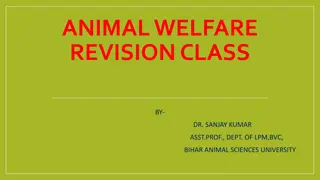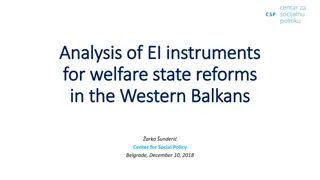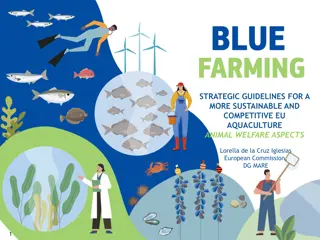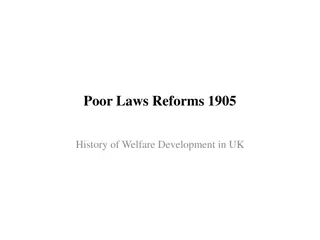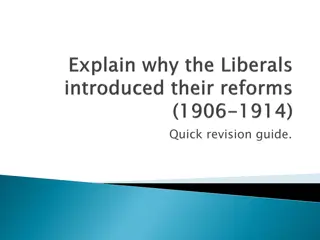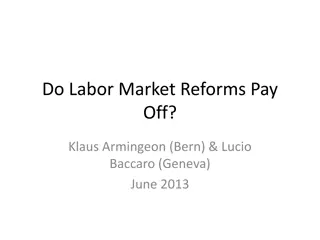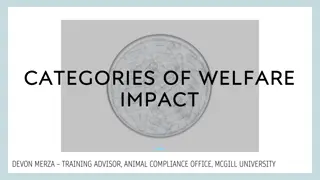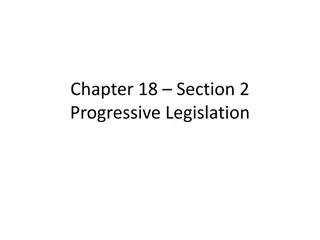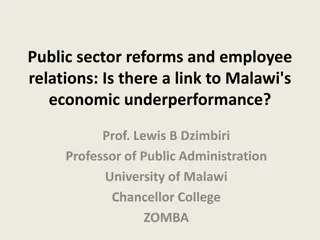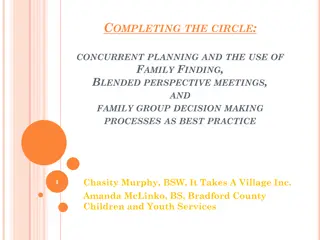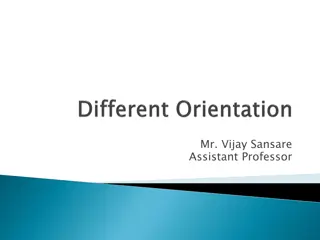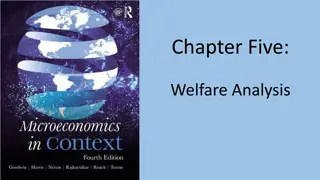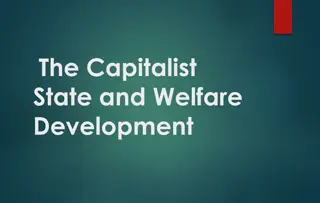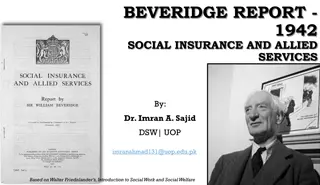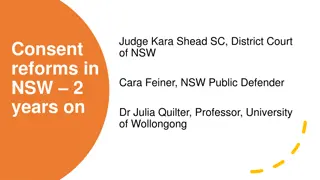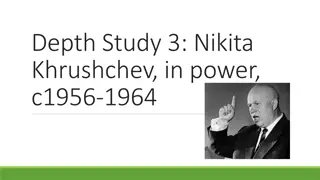Challenges and Opportunities for Reforms of Non-Oil Revenues Administration in South Sudan
The presentation highlights the reliance on oil revenues in South Sudan and the need for reforms in non-oil revenue administration. It discusses sources of non-oil revenue, factors hindering revenue mobilization, and opportunities for reforms to diversify the economy. The objectives of non-oil reven
3 views • 23 slides
Safety Health and Welfare.
The Campus Safety, Health, and Welfare (SHW) Committee at TU Dublin is vital for ensuring a safe and healthy environment for all members. Led by Edel Niland, the Senior Manager, the committee focuses on various aspects such as safety arrangements, committee structure, team organization, and safety t
3 views • 21 slides
Courses and Training on Child Welfare and Family Support
The Melograno Training Courses focus on combining scientific and methodological skills with practical experience in managing a variety of services for individuals and families. Drawing from the expertise of professionals with extensive backgrounds in psychology, social work, education, and counselin
2 views • 32 slides
Ensuring Welfare and Safeguarding in Sports Clubs: Forum Insights
In this forum, experts elaborate on the importance of appointing a Welfare Officer in clubs, provide safeguarding best practices, and highlight the link with inclusive insurance. Reasons for prioritizing welfare and safeguarding, along with actions taken to protect children and vulnerable adults, ar
2 views • 13 slides
Understanding Social Welfare and the Welfare State
Social welfare and the welfare state aim to provide a minimum income guarantee, support in times of personal and familial crises, and ensure access to certain social services without creating class distinctions. The welfare state intervenes in the economy to enhance social welfare by actively provid
6 views • 7 slides
Animal Welfare and Ethics: Standards and Regulations in India
The content covers a wide range of topics related to animal welfare, ethics, and laws in India. It delves into the definition of animal welfare, the role of veterinarians, animal welfare organizations, regulations like the Prevention of Cruelty to Animals Act, and protection of wildlife, working ani
0 views • 15 slides
Financial Sector Reforms in India: An Overview
In the early 1990s, India witnessed significant reforms in its financial sector, addressing issues like lack of transparency, extensive regulation, and financial repression. Key reforms included setting up expert committees, reducing SLR and CRR, implementing prudential norms, and deregulating inter
0 views • 18 slides
Understanding Common Welfare in Narcotics Anonymous
Explore the concept of common welfare in Narcotics Anonymous, where prioritizing the well-being of the group over individual desires leads to unity and growth. Discover how this principle guides members to support each other and the fellowship for mutual recovery and success. Learn how Tradition Fou
0 views • 15 slides
Understanding the Difference: Animal Rights vs. Animal Welfare
Explore the nuanced distinction between animal rights and animal welfare, delving into the ethical considerations, philosophies, and advocacy efforts surrounding these concepts. Discover how animal rights proponents emphasize the equal rights of animals, while animal welfare focuses on humane treatm
0 views • 36 slides
Welfare in Islam: A Comprehensive Perspective
The concept of welfare in Islam is deeply rooted in the teachings of the Holy Quran and the practices of Prophet Muhammad and his caliphs. Islam encompasses all aspects of life - social, political, economic, and personal - under its umbrella, emphasizing the importance of unity between temporal and
0 views • 79 slides
Evolution of Social Welfare Policy in Pakistan (1955) and its Impact
The social welfare policy in Pakistan originated in 1955 to address challenges like poverty, lack of education, health issues, inadequate housing, and social maladjustment. Starting with the influx of migrants post-independence in 1947, the policy aimed to establish social services and a welfare sta
4 views • 15 slides
Understanding Welfare Arrangements for Under-18 Students Applying for Student Visa
This content discusses the welfare arrangements available to under-18 students applying for a student visa, specifically focusing on options provided by the Department of Home Affairs and RMIT. It outlines two welfare options, approved accommodation and caregiver services, as well as RMIT-approved a
0 views • 11 slides
Economic Reforms Since 1991: Liberalisation and Industrial Sector Reforms
Economic reforms initiated in 1991 under the New Economic Policy focused on liberalisation, privatisation, and globalisation to accelerate economic growth. Liberalisation involved deregulation of the industrial sector, abolishment of industrial licensing, reduction of public sector industries, de-re
0 views • 9 slides
Understanding the Difference Between Social Work and Social Welfare
Social work and social welfare are often used interchangeably, but there are distinct differences between the two. Social work involves highly trained professionals providing services to individuals and communities in need, using problem-solving methods. On the other hand, social welfare focuses on
0 views • 9 slides
Understanding the Relationship Between Social Welfare and Social Work
Social welfare and social work are interconnected concepts aimed at enhancing societal well-being. Social welfare refers to a nation's system of programs and services meeting essential needs, while social work involves professional activities supporting individuals and communities in achieving socia
0 views • 6 slides
Progressive Reforms and Social Movements in American Life
The Progressive era in American history saw significant reforms in three key areas: Temperance (alcohol), Women's Rights, and Civil Rights. Various laws, organizations, and individuals played crucial roles in driving these reforms, such as the 18th Amendment, the National Woman's Party, the 19th Ame
0 views • 7 slides
Evolution of the Kenyan Water Sector: Reforms and Innovations
The Kenyan water sector has undergone significant reforms and institutional changes over the years. Beginning with the establishment of the Ministry of Water in 1974, followed by the enactment of the Water Act 2002 and subsequent reforms, new institutions such as WASREB, WSBs, WRMA, and WSPs were cr
0 views • 15 slides
Structuration Analysis of Central Government Accounting Practices and Reforms in Emerging Economies: A Study from Nepal
Delve into the nuances of central government accounting practices and reforms in emerging economies, focusing on Nepal. The study explores why key stakeholders resist externally-driven changes, investigates the unintended consequences of reforms, and highlights the role of organizational actors in s
0 views • 21 slides
Evaluation of Labour Reforms 1945-51 and Their Impact on Poverty Alleviation
Following their landslide victory in 1945, the Labour Government under Clement Attlee implemented a series of reforms aimed at addressing poverty in post-WWII Britain. The Beveridge Report highlighted the giants of poverty - Want, Disease, Idleness, Squalor, and Ignorance - serving as the blueprint
0 views • 29 slides
Understanding Animal Welfare and Five Freedoms in Farming
Animal welfare encompasses physical and mental wellbeing, allowing animals to express natural behaviors. The Five Freedoms outline essential welfare needs, making sure animals are free from hunger, discomfort, pain, fear, and distress. The Farm Animal Welfare Council ensures these needs are met for
0 views • 16 slides
Understanding Animal Welfare and Ethics in Veterinary Practice
Animal welfare is about ensuring the well-being of animals by providing proper care, treatment, and humane handling. It involves considering their physical and mental needs, preventing suffering, and promoting ethical treatment. Veterinarians play a crucial role in upholding animal welfare through d
0 views • 14 slides
Analysis of EU Instruments for Welfare State Reforms in Western Balkans
Analysis of European Union instruments, such as the European Semester, in promoting welfare state reforms in the Western Balkans. Discusses policy harmonization, coordination, and funding mechanisms through the EU structural funds. Highlights how the EU governance mechanisms impact domestic welfare
0 views • 13 slides
Evolution of Child Welfare Policy in England
Since the public inquiry into the death of Maria Colwell in 1973/74, public inquiries have been instrumental in driving policy, practice, and legislative changes in child welfare and protection in England. The tragic cases of Maria Colwell and Victoria Climbe led to significant reforms, including th
0 views • 18 slides
Club & Society Welfare Training 2021/22 - Guidelines for Welfare Officers
This presentation provides essential guidelines for Welfare Officers of Sports Clubs and Societies to ensure the physical and mental well-being of members. It covers topics such as the role of a Welfare Officer, GDPR compliance, insurance requirements, and more. The training emphasizes the importanc
0 views • 47 slides
Enhancing Animal Welfare in EU Aquaculture: Strategic Guidelines for Sustainability
Strategic guidelines focus on EU aquaculture policy, aiming to improve animal welfare, meet societal demands, and align with the European Green Deal. Key objectives include growth, sustainability, and competitiveness, with a focus on resilience and knowledge enhancement. Specific horizontal objectiv
0 views • 10 slides
A Comprehensive Guide to Welfare Benefits and State Pension
Understanding different types of welfare benefits such as contributory, non-contributory, and means-tested benefits is crucial for individuals navigating the welfare system. This guide covers a range of benefits including State Pension, Pension Credit, Universal Credit, and more, providing valuable
0 views • 12 slides
History of Poor Laws Reforms in the UK (1905) - Development of Welfare
In 1905, the Liberal Party in the UK promised reforms for the poor laws and aid for the unemployed. A Royal Commission was appointed to address the distress caused by mass unemployment, with key figures like Beatrice Webb and Sidney Webb playing significant roles. This period marked a crucial turnin
0 views • 10 slides
Welfare Reforms in the 19th Century: A Historical Overview
In the 19th century, poverty was often blamed on individuals, leading to a laissez-faire approach by the government. Key figures like Charles Booth and Seebohm Rowntree conducted insightful studies on poverty, highlighting the need for welfare reforms. The emergence of genuine concern for the poor a
0 views • 8 slides
Labor Market Reforms and Unemployment: A Detailed Analysis
Labor market reforms and their impact on unemployment rates are examined through a Difference-in-Differences analysis in this study led by Armingeon and Baccaro in June 2013. The research questions whether liberalizing reforms actually reduce unemployment and increase employment levels. The findings
0 views • 13 slides
Evolution of Welfare Impact Categories in Animal Research Guidelines
Canadian Council on Animal Care (CCAC) published updated guidelines titled "Categories of Welfare Impact" in 2024, replacing the Categories of Invasiveness. The new guidelines focus on animal experiences, procedures carried out on animals, and positive impacts on animal welfare. The categories (A-E)
0 views • 21 slides
Progressive Reforms in the United States
Progressive movements in the United States during the late 19th and early 20th centuries led to significant legislative changes at the federal, state, and municipal levels. Efforts focused on expanding the role of government in social welfare programs, municipal reforms to combat corruption, innovat
0 views • 10 slides
Public Sector Reforms in Malawi: Impact on Economic Performance
The presentation explores the link between public sector reforms and economic underperformance in Malawi. It discusses the history of public sector reforms in Africa and Malawi, employee relations, and various generations of reforms. The context of Malawi's economic realities at independence and res
0 views • 63 slides
Enhancing Child Welfare Through Concurrent Planning and Family Engagement
This paper explores the implementation of concurrent planning and family engagement strategies in child welfare services, focusing on practices such as family finding, blended perspective meetings, and family group decision-making processes. It discusses the importance of involving relatives and kin
0 views • 16 slides
Social Welfare Maximization and Truthful Mechanisms in Curricula Review
Explore the concept of social welfare maximization through the lens of truthful mechanisms in curriculum review. Understand the VCG mechanism, Nash equilibrium, and the formal definition of maximizing social welfare. Learn about the importance of designing mechanisms that promote honesty and optimiz
0 views • 36 slides
Understanding India as a Welfare State: Role and Commitment
India, as a welfare state, prioritizes the well-being and development of its citizens. It plays a key role in providing social services, promoting equality, and ensuring economic and social well-being. The concept of a welfare state in India is deeply ingrained in its governance and constitutional p
0 views • 22 slides
Understanding Welfare Analysis in Economics
Delve into the world of welfare analysis through the examination of demand and supply curves, consumer surplus, producer surplus, and social welfare at market equilibrium. Explore the impact of price ceilings and price floors on welfare, gaining insights into market dynamics and economic outcomes.
0 views • 12 slides
Evolution of Capitalism and Welfare Development
Earnest Mandel identified three types of capitalism - industrial, entrepreneurial, and corporate - each influencing welfare development differently. Industrial capitalism lacked state welfare, while entrepreneurial capitalism introduced social security measures. Corporate capitalism necessitated sta
0 views • 10 slides
The Beveridge Report and its Social Welfare Impact During World War II
The Beveridge Report, commissioned during the Second World War, led to significant social welfare reforms in Britain. Under the chairmanship of William Beveridge, the committee assessed the country's social services, paving the way for recommendations that shaped the future of social insurance and a
0 views • 16 slides
NSW Consent Reforms: Legislative Changes and Impacts on Sexual Assault Laws
In the past 40+ years, the NSW legislative landscape has seen significant changes in addressing sexual assault, culminating in the recent Crimes Legislation Amendment (Sexual Consent Reforms) Act 2021. These reforms implement recommendations, introduce affirmative consent model, and enhance provisio
0 views • 32 slides
Deep Dive into Nikita Khrushchev's Reforms and Removal from Power
Explore the transformative reforms and eventual downfall of Nikita Khrushchev during his tenure from 1956-1964. Delve into topics like Cold War dynamics, agricultural reforms, de-Stalinization, control of Eastern Europe, and reasons for his removal from power. Uncover the debates surrounding the ext
0 views • 7 slides
